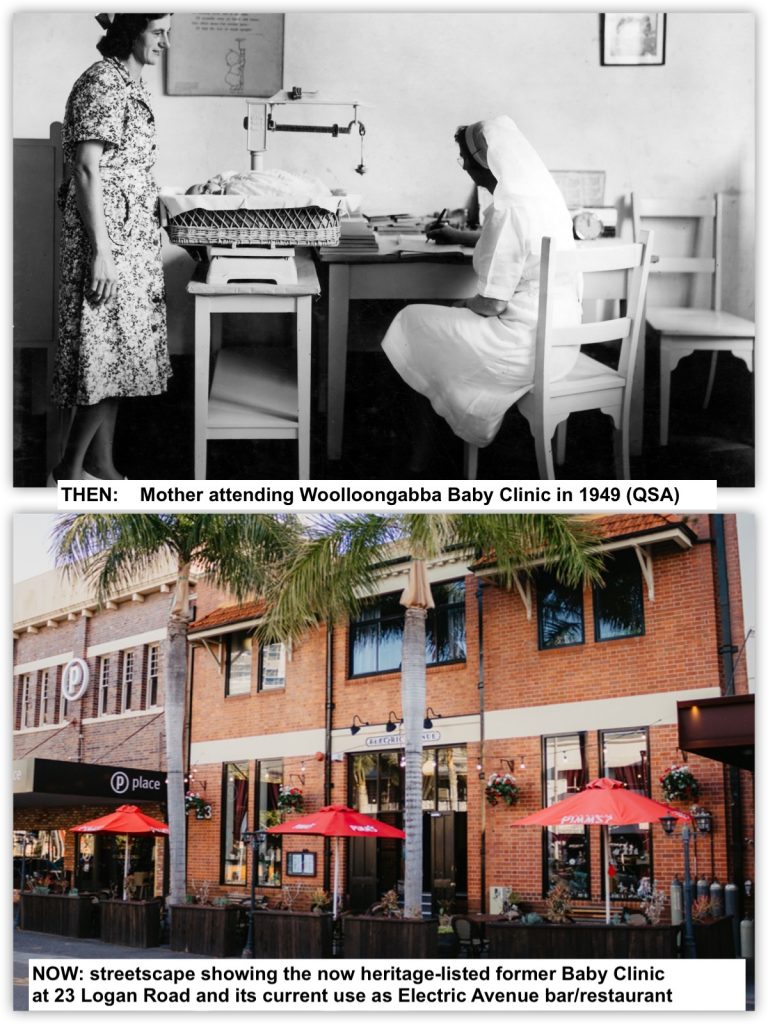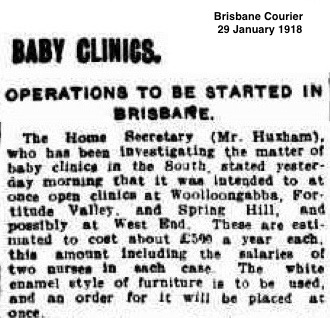Woolloongabba Baby Clinic (former), 23 Logan Road

High infant and maternal mortality rates were a big health problem during the early days of the Queensland colony. In 1876 one in four children did not live to their first birthday, by 1910 this had reduced to one in nine as a result of the diphtheria antitoxin introduced in 1894 by Dr A.J. Turner.
 In response to social pressures by women’s organisations and the medical profession the Government set up baby clinics to improve the health of mothers and babies through maternal education.
In response to social pressures by women’s organisations and the medical profession the Government set up baby clinics to improve the health of mothers and babies through maternal education.

In 1918 the first four baby clinics were established in small wooden cottages in inner-city suburbs of Brisbane; the first on 8 March 1918 in Fortitude Valley, followed by Woolloongabba on 11 March 1918, then Spring Hill and West End. By 1925 eight more had been opened in major rural centres and by World War II there were over 100 baby clinics in Queensland.
The passing of the Maternity Act 1922 was a major factor in improving maternal and child welfare. Its four aims were: to decrease the death rate of mothers and babies, to increase the birth rate, to increase outback settlement, and to train mothers in how to care for children. Larger, purpose-built brick clinics replaced the original baby clinics – the first in Fortitude Valley in 1923 is now a State heritage-listed building. They were funded from proceeds of the Golden Casket. The Woolloongabba Baby Clinic was completed by 1928 and provided free advice to mothers up to the late 20th century.
The two-storey red brick building with corrugated iron roof at 23 Logan Road was purpose-built as a maternal and child welfare Clinic across the road from the original 1918 rented cottage which could no longer cope with increasing attendances. It was built with funds raised by the Golden Casket lottery and opened in 1928. An ante-natal clinic was incorporated in 1929. The centre provided support for mothers and their babies until it was sold in the late 1990s.
 Since then it has served as an iconic bar and dining venue with various owners proudly embracing its heritage. In 2009 it was the home of the Crosstown Eating House advertised as ‘a hip new restaurant in a 1920’s building”, it changed its name to Crosstown Public House in 2016 and is currently known as Electric Avenue.
Since then it has served as an iconic bar and dining venue with various owners proudly embracing its heritage. In 2009 it was the home of the Crosstown Eating House advertised as ‘a hip new restaurant in a 1920’s building”, it changed its name to Crosstown Public House in 2016 and is currently known as Electric Avenue.

The substantially intact building was entered on the Local Heritage Register on 1 July 2002 in recognition of its cultural heritage; contribution to the streetscape of this part of Logan Road as a unique, non-standard design baby clinic ; and association with the establishment of maternal and child welfare services in Queensland.
